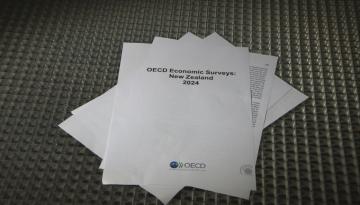
Our definition of productivity is broken, podcaster and academic Cal Newport says.
Newport is the host of the popular podcast Deep Questions and professor of computer science at Georgetown University.
In his new book, Slow Productivity: The Lost Art of Accomplishment without Burnout, he advocates for doing fewer things better.
"We do what I call pseudo productivity, which uses activity as our main proxy for useful effort.
"This doesn't work. It just burns us out, we go faster and faster, we go shallower and shallower and very little of value actually gets done," he told RNZ's Afternoons.
Knowledge workers, in particular, are getting exhausted by the "pseudo productivity hamster wheel", he said.
"We're bad at productivity in knowledge work. When we're in a factory, productivity is pretty simple to define, how many automobiles do we produce today? There's a clear number.
"We don't have something like that to measure knowledge work. That's why we fell back onto this pseudo productivity proxy. I'll just be busy. If I'm being busy, at least it's not the case that I'm slacking off."
Distraction is the enemy of focused, quality work, he said.
"You have to recognise how damaging it is to your ability to produce high-value work when you have these little distractions.
"We think it's innocent, I'm glancing at my inbox because I'm waiting for an email. What's the harm? I'm just glancing at it every few minutes.
"The problem is, even glancing at that inbox can cause a huge shift in your neural state."
It can take 15 to 20 minutes to regain focus on a difficult task after just glancing at an email inbox, he said.
"All these little glances and quick checks - 'let me just jump on Slack and see what's going on over here' - is making us quite literally stupider.
"It's as if we're taking a slug of whiskey every hour while we work, but without the fun part in terms of what it is actually doing to our ability to concentrate."
These shifts of attention are "productivity poison", he said. If you're working on a challenging task, then it requires your undiluted attention.
"You need a certain purity of concentration to actually get anywhere near your full cognitive capacity out of your brain."
He believes we should work on fewer tasks at any one time.
"Work on fewer things at once, do them faster, do them better, and then move on to the next. That is a rhythm of work in which you have less of this pressure in your inboxes demanding your attention."
Doing fewer things is not the same as accomplishing fewer things, he said.
"My suggestion is when you have your list of things you're supposed to do, choose a couple and say, 'This is what I'm actively working on right now'.
"Everything else I've agreed to do, but I'm waiting to work on that and I'm not doing emails or meetings about the stuff I'm waiting for."
Fast does not mean productive, he said.
"Fast is checking an inbox 250 times a day, fast is jumping from Slack to a meeting, back to Slack, back to a meeting in this sort of frenetic dance all day long.
"It's speed, it's rapidity, it's responsiveness, that's what fast productivity is, but it doesn't produce results."
Slow productivity is less about busyness, more about results, he said.
"It looks really slow, because it's just me working on one thing very carefully.
"But when you zoom out to a year, you say, wow, you produced a lot of really good things."
He also cautions against this "pseudo-activity" mindset drifting into our free time. Hobbies should be hobbies; take time with them and don't clutter your free time with deadlines, he said. And don't clock off work to merely clock on to social media.
"One of the things you experience when you don't use social media is that you get your time back.
"We don't notice the degree to which, when we're a heavy social media user, that basically after we leave the office and go home, we're clocking in for our shift at the Facebook or the Instagram or the TikTok factory."
Don't be a guinea pig for the attention economy, he said. Digital minimalism is his philosophy.
"You've got to be driven by your values. Figure out first what's important to me? What do I want to spend my time doing?"
If tech can help you be better at your passion project, that's fine, he said.
"This is different than how most people deal with personal technology, which is bring everything into your life by default, and only take it out of your life if it really, really feels like you have to do it.
"I seek to flip that script. Don't add something to your life until you know that it's bringing you a very specific value."
Don't let the phone be a constant companion; demote it back to being a tool that you use for specific things that are very useful, he said.
"By looking at our phone at every down moment, we exhaust our brain, and we get anxious.
"The other thing we miss is that time alone with our own thoughts. And we know this from philosophy and psychology, time alone with our own thoughts is how we make sense of our world and grow as humans."
RNZ


